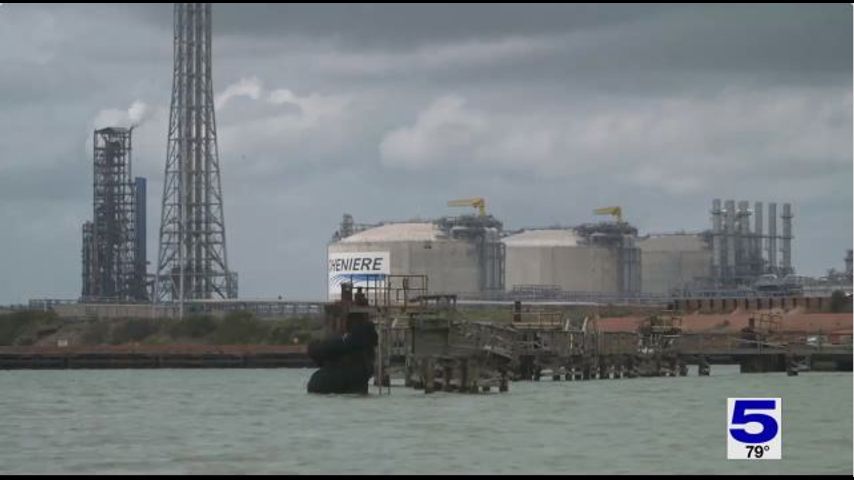As fuel prices peak, South Texas companies plan to export more abroad
High fuel prices continue to affect South Texans as billions of barrels of oil and equivalent quantities in natural gas are exported, with plans to expand export capacity in this region.
Mexican fuel tanker trucks are visiting the Port of Brownsville on a daily basis. And at the Port of Corpus Christi, ship-bound exports are done on a global scale.
The U.S. is exporting about a third of its petroleum production, and about a fifth of its natural gas, according to the Energy Information Administration from 2021.
Petroleum exports reached 8.63 million barrels and 2.9 million barrels of crude oil per day. Natural gas exports reached a record high of 6.65 trillion cubic feet.
In 2021, the U.S. delivered half of its natural gas exports by pipeline to Canada and Mexico. The growing liquified natural gas industry accounted for the rest, with ocean-bound tankers supplying the largest overseas customer, China, with 450 billion cubic feet. South Korea, Brazil, Japan and India were also large customers.
The impacts of that export surge comes to a head at the Quinta Channel facing the City of Ingleside on the Bay. Residents, straddled on both sides by growing oil and gas export operations, are urging caution.
"If there was a spill or anything, it would come right by my house," Steve Wilder said. His home is about half a mile from the growing Enbridge Ingleside Energy Center, which has plans to expand.
Wilder and fellow Ingleside resident Patrick Nye said they're seeing several tankers per day, bringing more waves against their piers.
“The waves have busted my boat off of my pier twice,” Wilder said.
An Enbridge spokesperson said the company is "exploring opportunities to expand the facility and increase our capacity." Permit applications approved by the U.S. Army Corps of Engineers are being challenged in court by the local organization Ingleside on the Bay Coastal Watch Association and other groups.
"We're exporting oil from our own country, and we're importing oil - about the same amount from countries we can't control,” said Patrick Nye, president of the group.
Four miles to the northwest, liquified natural gas exporter Cheniere loads tankers for overseas export. Last year, the company exported 712 billion cubic feet of natural gas, according to U.S. Department of Energy numbers. That's roughly the equivalent of the state of Georgia, which consumed 759 billion cubic feet in 2020, according to the EIS.
Cheniere says 75 percent of natural gas volume were delivered to Europe in the first quarter of 2022.
This summer, Cheniere plans to make a final investment decision on an expansion at its Corpus Christi facility adding capacity for an additional 487 billion cubic feet per year of natural gas. A company spokesperson said the site is already being prepared by Bechtel Corporation, a construction partner.
The company signed a 13-year agreement last October to supply China with 44 billion cubic feet per year of natural gas. Natural gas exports in 2021 went to 41 countries, according to the EIS.
The Port of Brownsville is also looking to expand exports. In May 2021, Sunoco LP announced the development of a refined products terminal at the Port of Brownsville, to facilitate exports to Mexico according to the Port. The Port says ultra-low sulfur diesel and premium gasoline are popular exports to Mexico.
In 2019, the Port of Corpus Christi closed the year with record tonnage, crediting in large part expansion in oil and LNG exports. Growth in crude oil was primarily linked to two new crude pipelines from the Permian Basin. The annual gain in crude exports was 26.8 percent. Liquified gas increased by 316.8 billion cubic feet, as Cheniere Energy commissioned its first LNG train in 2018 and second in late 2019.
The Port of Corpus Christi said restricting global exports could actually lead to higher prices.
"In general, there is limited refining capacity here in the U.S., and those that are able to process U.S. blends of crude oil are already doing so at capacity," said a spokesperson. "Excess crude oil production is exported to our allies and trading partners around the world. Constraining the supply of exported crude likely would drive worldwide oil prices higher."
Enbridge said its Ingleside facility is facilitating greater supply and sustainment of North American energy.
"We see the facility meeting that need and playing an even greater role in global energy security and sustainability," said a spokesperson. "It’s an important mission.”
Cheniere said its business model permits better prices worldwide.
"Our business is based on stable, low-cost natural gas, and much like consumers and customers around the world," said a spokesperson. "We want those to be the conditions long-term as well."





